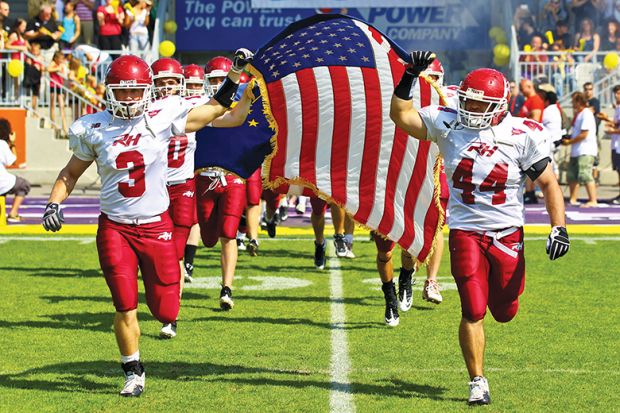“I’m a theorist,” said Martha Nussbaum, “and would be quite bad at doing actual politics because it would keep me awake at night.”
Now Ernst Freund distinguished service professor of law and ethics at the University of Chicago, the acclaimed philosopher recently received the prestigious Holberg Prize, awarded annually by the Norwegian government to an outstanding scholar in the humanities, social science, law or theology.
Much of her prolific writing – on law and literature, ethics and emotions, feminism and human rights – touches on major policy debates. Her “capabilities approach” to human well-being had been very influential among those working in development and was “now a cottage industry”, she acknowledged, with its own Human Capability and Development Association “designed to bridge the gap between theory and practice”.
Nonetheless, Professor Nussbaum insisted, “I don’t do policy in a direct way…My work on feminism does intervene in very concrete debates, but always as a philosopher – I’m not saying what the statutes should be like.”
Even her 2018 book, The Monarchy of Fear: A Philosopher Looks at Our Political Crisis, written in horrified response to the election of Donald Trump, “deliberately takes a stand above any concrete events because it’s meant not to be obsolete tomorrow”.
In the past, Professor Nussbaum went on, she had been even more wary of direct policy interventions in countries other than her own. On her many visits to India, for example, she once made a point of only “teaching very high theory”. But she eventually decided to “start saying things which were much more concrete, for example about the need to repeal the sodomy laws, when Indian colleagues who were subject to restrictions on their academic freedom asked me to speak out”.
In one of several forthcoming books, Citadels of Pride: Sexual Abuse, Accountability, and Reconciliation, out in June, Professor Nussbaum turns to a major societal challenge universities have also been wrestling with.
The 2018 hearings when Supreme Court nominee Brett Kavanaugh faced accusations of sexual assault had made her realise, she recalled, that “all kinds of things, both legal and ethical, were being totally mangled in the public debate”. As always, therefore, she had attempted to “go to the roots of the problem” by considering the vice of pride and the ways that “a kind of toxic, proud masculinity is not being held to account” in many areas of life.
But she had also decided to address head on specific “bad structures” within American universities. One is the combination of a fraternity culture with a comparatively high minimum drinking age of 21.
“College administrators would like it to be lower,” Professor Nussbaum explained, so they “could go and supervise drunken [fraternity] parties”. They were powerless to do so now, since they would be “liable to be arrested for contributing to the delinquency of a minor”.
Equally pernicious was “the terribly corrupt world of college sport”.
“The whole culture of college football and basketball corrupts the academic enterprise,” Professor Nussbaum pointed out, “because these athletes have to get passing grades. But it is also a culture of deep sexual corruption. Women are basically pimped out when they are trying to recruit star athletes.”
While professional leagues were beginning to address the problem, she went on, “the colleges are all competing for a very small number of star recruits and a lot of money is on the line – the football coach in any university with a Division 1 team is paid much more than the president. It’s a terribly diseased power structure.”
As a result, Professor Nussbaum was keen to see “the complete elimination of Division 1 college football and basketball”, noting that the commissioner of the National Basketball Association – lawyer Adam Silver – has also “been calling for that”.
In 2010, she published Not for Profit: Why Democracy Needs the Humanities, which took the almost apocalyptic line that “a worldwide crisis in education” was “likely to be, in the long run, far more damaging to the future of democratic self-government” than the economic crisis of 2008.
So does she feel any more optimistic today?
There were “very encouraging signs” in the US, Professor Nussbaum replied, where a state-based system of higher education meant that “Trump didn’t hurt us in any way except on the issue of student immigration, and that’s already being reversed” following the election of Joe Biden, and where “the liberal arts structures are still strong”.
She greatly regretted, however, that there were only “little experiments” in adopting the same model elsewhere, given that “as long as you only do one subject at university, the humanities will always be at a disadvantage. People think: ‘I can’t make a career there, so I’d better do something else’…It shouldn’t be a question of doing either all philosophy or no philosophy.”
Register to continue
Why register?
- Registration is free and only takes a moment
- Once registered, you can read 3 articles a month
- Sign up for our newsletter
Subscribe
Or subscribe for unlimited access to:
- Unlimited access to news, views, insights & reviews
- Digital editions
- Digital access to THE’s university and college rankings analysis
Already registered or a current subscriber? Login








